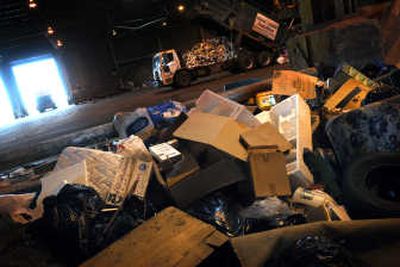Compost program is a real gas hog

What’s touted as an environmental solution for waste in Spokane County is becoming a serious gas guzzler.
Almost 50,000 tons of yard waste was diverted from landfills in 2007 to be recycled into soil.
Environmental advocates and budget hawks agree that composting is best for the planet and cheaper than dumping debris in landfills, but they question why it must be shipped 140 miles from Spokane.
Just this month, the Spokane City Council approved an agreement that will double the cost the Spokane Regional Solid Waste System pays to transport the waste, to about $80,000 a year, because of the increasing price of diesel.
Yard waste from Spokane is trucked to Royal City, Wash. In the busiest seasons, 15 trucks a day carrying 25 tons of waste leave Spokane County for the Central Washington town, said Damon Taam, the system’s contract manager.
In a time of rising concerns about fuel costs and climate change, some local leaders say a new effort should be made to find a composting site in Spokane County.
“It seems absolutely absurd to be hauling compost out of the county or even out of the city when it could be used here,” Spokane City Councilman Richard Rush said. “We need bigger thinking.”
Composting waste in the county isn’t a new idea.
When the city and county began collecting yard waste in the 1990s, they composted it in Colbert. The system was successful in finding buyers for the compost, but odors generated from the site soon forced the system to buy some nearby homes.
Spokane closed the site in 2002 after a weed killer used on lawns was found not to break down in the composting process, making the compost unmarketable. The city joined a class-action lawsuit against Dow Chemical Co., the maker of the weed killer, arguing it experienced damages in excess of $1 million. The suit is pending in an Illinois court, said Tim Szambelan, assistant city attorney.
Since the closure, the city has contracted with Waste Management to ship the waste away. Until last year, it was sent to a dairy in Oregon.
“Waste Management and us would love to have something local, but it has to be properly licensed,” Taam said. “To license and permit an operation in Spokane County, there are going to be some challenges.”
And given Spokane’s headaches the last time around, system officials say they’re not eager to restart.
Last year, Waste Management began sending the waste to Royal Organic Products in Royal City on land owned by B&G Farms, a business that has been fined on multiple occasions for environmental violations.
Although it sits on B&G land, the composting business is run by another firm, said Marni Solheim, state Department of Ecology environmental specialist.
Composting was started in Royal City a few years ago to take care of 150,000 tons of mint waste from B&G that had been sitting on the farm – occasionally catching fire through spontaneous combustion, said Steve Verhey, a former Central Washington University biology professor who helped set up the composting site. Once that waste was composted there was capacity to take Spokane’s yard waste, he said.
Verhey said it would be smarter for Spokane to compost its material closer to town. But there shouldn’t be significant worries about B&G’s involvement because it’s regulated, it’s run by another business and there’s a strong incentive to produce quality compost to make a profit, he said.
“For a business that has had some real serious problems in the past, this is a bright spot,” Verhey said.
Solheim said Royal City is the closest permitted site big enough to serve Spokane. She said she recently met with city and county officials about starting one in Spokane County.
The difficulty in creating a composting site in Spokane County will be finding a place far enough from homes to prevent complaints about odors. She added, however, that if done properly a composting operation should not generate a significant stench.
“No one wants a giant composting area near their homes,” said Spokane City Councilman Michael Allen. “If there was a market for it, I would assume someone would have stepped up by now.”
But County Commissioner Mark Richard said he remains hopeful that a new composting site will be found.
“We need to keep it as affordable as possible,” Richard said.
City Councilman Bob Apple argues that one way to help push for a closer site would be to refuse to contribute to Waste Management’s growing fuel costs to ship the waste to Royal City.
The contract the city signed with the company in 2003 does not require Spokane to contribute to increases in diesel prices. Apple says making Waste Management pay the full cost would give them an incentive to help find a cheaper option for composting.
But Russ Menke, interim director of the waste system, said it’s only fair for Spokane to help pay for fuel because the average price of diesel has more than doubled since the contract was signed. Spokane already agreed to pay about $40,000 a year of the fuel cost on top of the $41.50-a-ton fee the city pays Waste Management to take care of yard waste.
Attempts made to reach Waste Management officials were unsuccessful Wednesday.
Richard supports increasing Spokane’s fuel contribution to $80,000, an action that still must be approved by the County Commission.
“We could hold (Waste Management) over a barrel, but then they would probably issue their 30-day notice,” of terminating the contract, Richard said. “It’s not going to do us any good if we lose this contract.”